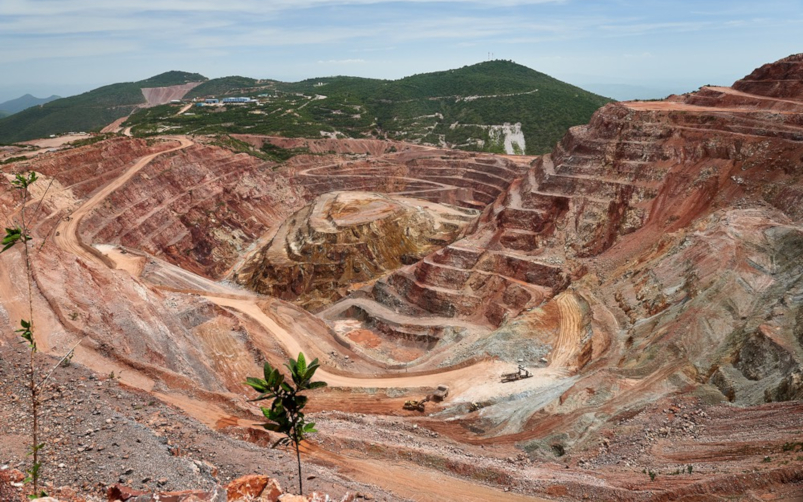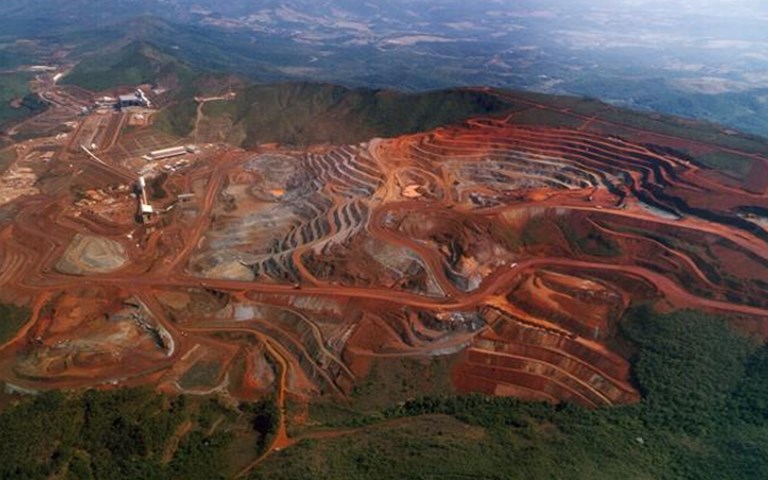Vale was forced to halt operations at its Brucutu mine this week, after it was ordered by a Brazilian court to cease using eight of its tailings dams, including the one for the mine. Courtesy of Vale
(Like what you’re reading? Get our news recap delivered straight to your inbox each Friday.)
Welcome back to your Friday mining news recap. In the headlines this week: Vale and ArcelorMittal evacuate hundreds in Brazil, heavy rains in Chile have prompted work stoppages at three mines, and some commodity predictions for 2019.
The fallout from the Córrego de Feijão tailings dam collapse, which has killed more than 130 and left 199 missing, continued this week. Vale was forced to halt operations at Brucutu, its largest operation in Minas Gerais, after a Brazilian court ordered the company to stop using eight of its tailings dams, including the one at Brucutu. Two days later, Vale had its permit for that same dam revoked, as well as the permit for its Jangada mine. And reports from the Wall Street Journal and Brazilian television channel Globo TV indicate that Vale was warned by inspectors months before the collapse of faulty water drainage and monitoring systems at the dam, and that the company knew there were issues with sensors on the dam days before it burst.
This morning, 700 people in Brazil were evacuated by Vale and ArcelorMittal, due to concerns about the stability of two upstream dams. Vale was ordered by Brazil’s mining agency to evacuate about 500 people in three communities near its Gongo Soco mine near Belo Horizonte as a precautionary measure, and ArcelorMittal evacuated 200 people near its idled Serra Azul upstream tailings dam near Brumadinho, after a recent site-based assessment of the dam.
Deloitte released its annual Tracking the Trends report on Monday. The report, which analyzes the top 10 issues transforming the future of mining, said changing mining strategy, the adoption of analytics and artificial intelligence and managing risk in the digital era would be the three most influential trends for 2019. Miners will need to rethink their strategy to include growing concerns over consumer awareness, social license and geographic risk, the company said.
We’ve got a double dose of commodities analysis for you this week. Commodities fell short of analysts’ rosy predictions for 2018 due to trade tensions and slowed economic growth, but there’s room for a rebalance in 2019. This year, commodity market watchers will be paying attention to China, where stimulus projects, trade tensions and the country’s economic slowdown will influence the outcomes of most commodities.
A magnitude 2.9 seismic event was reported at Vale's Garson mine in Sudbury on Wednesday evening. The company said no employees were underground at the time, and all workers had been accounted for. Vale will assess any damage once the area is safe to return to.
Heavy rains in northern Chile have caused work stoppages at Codelco’s Chuquicamata and Ministro Hales mines, and Freeport-McMoRan’s El Abra mine, Mining.com reported today. Codelco sent daytime shift workers home as a preventative measure. The rainstorms have killed three people, made roads inaccessible, damaged houses and put the region at risk of land and rock slides.
Glencore is cutting workers at its Mutanda mine in the Democratic Republic of the Congo in response to higher costs under the country’s new mining code and lowered cobalt prices, according to the Financial Times (subscribers). The company is cutting expat workers and not renewing contracts for external contractors, but no DRC workers will be asked to leave. The move comes the same week as the company reclassified an ore body at Mutanda to Probable Reserves from Proven Reserves, due to the “uncertain political and increased cost environment.”
Pre-construction work is advancing at Mason Graphite’s Lac Guéret project near Baie-Comeau, Quebec. The company said on Friday it received most of its grinding mills and two press filters, and it has all its permits for beginning construction at the mine and plant site. According to Mason’s 2015 feasibility study, Lac Guéret has Mineral Reserves of 4.7 million tonnes at a grade of 27.8 per cent Cg (carbon graphite), and a projected mine life of 25 years.
If you’re looking for some weekend reading, we have a story from our February issue online now. As the price of vanadium skyrockets, Vancouver-based First Vanadium is trying to get its Nevada project off the ground.



